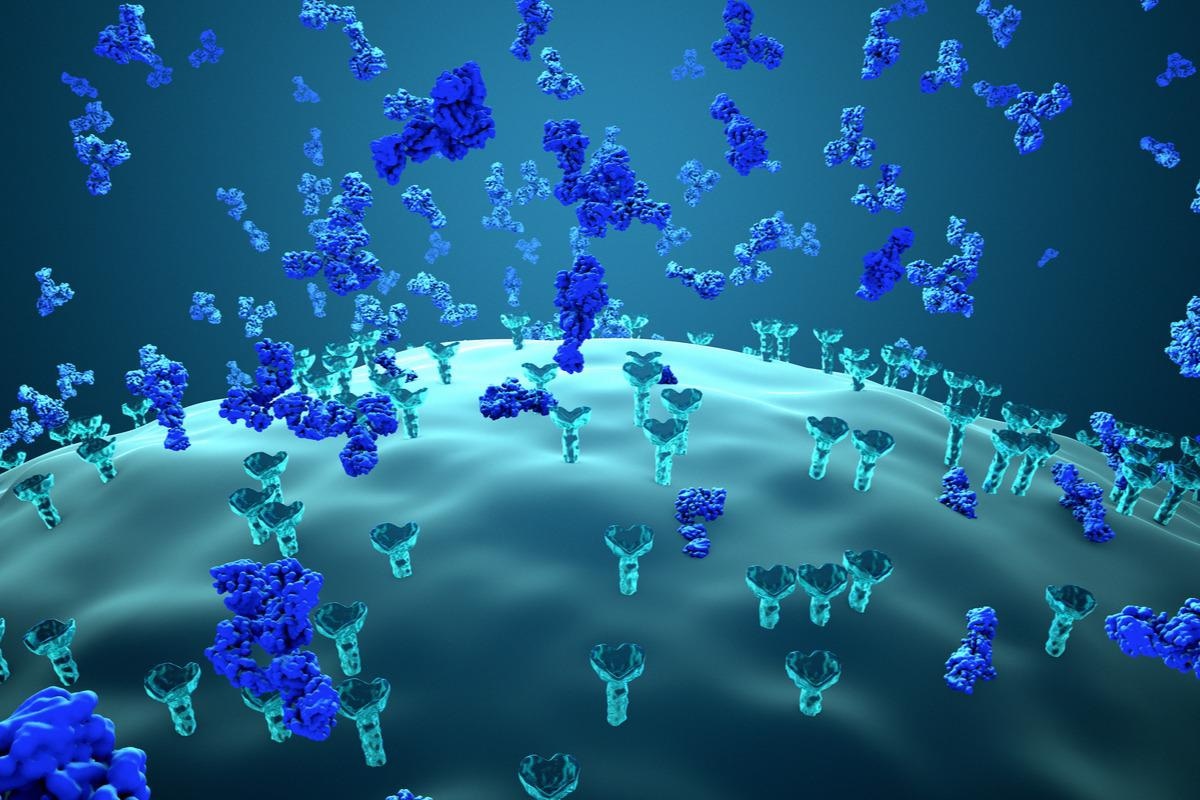Many antibody therapeutics have been developed to treat severe acute respiratory syndrome coronavirus 2 (SARS-CoV-2) infections since the inception of the coronavirus disease 2019 (COVID-19) pandemic. This is important because therapeutics reduce hospitalization and effectively neutralize the virus in patients with mild to moderate symptoms. The therapeutics developed thus far mainly target the SARS-CoV-2 spike protein, but their efficiency has been reduced owing to the mutations of the virus.
 Study: MG1141A as a Highly Potent Monoclonal Neutralizing Antibody Against SARS-CoV-2 Variants. Image Credit: Design_Cells/Shutterstock
Study: MG1141A as a Highly Potent Monoclonal Neutralizing Antibody Against SARS-CoV-2 Variants. Image Credit: Design_Cells/Shutterstock
A new study has been published in Frontiers in Immunology, where scientists developed a universal SARS-CoV-2 neutralizing antibody, MG1141A. Scientists confirmed that that MG1141A retained its neutralizing activity against the alpha (UK), beta (South Africa), and gamma (Brazil) variants of SARS-CoV-2.
Background
The spike (S) protein of SARS-CoV-2 is the primary target for therapeutic agents and vaccines as it directly modulates host cell infection. The antibody neutralizes the virus by binding to the RBD of the viral S protein and preventing its binding with the host cell receptor ACE2. However, SARS-CoV-2 variants with S protein mutations hamper this process.
The initial S protein mutation was a D614G mutation in the G clade, which mutation promoted the “standing-up” conformation of the RBD. All the SARS-CoV-2 variants detected in 2021 possess this mutation, and this mutation has not been seen to reduce the efficacy of antibody therapy.
Recent mutations, such as N501Y, K417N, E484K, and K417T, are located in the receptor-binding motif (RBM), which directly binds to ACE2 in RBD. These mutations increase the infectivity of the virus by increasing the affinity of SARS-CoV-2 toward ACE2.
Additionally, it must be noted that RBM is a major epitope to which a therapeutic neutralizing antibody binds, and mutations in the RBM reduce the affinity of neutralizing antibodies. These mutations have also been reported to reduce the efficacy of vaccines. There is, therefore, a need to develop therapeutic antibodies that will be effective against SARS-CoV-2 variants in the future.
A new study
Scientists generated the initial candidate antibodies through mouse immunization, as human antibodies are produced in transgenic mice using human antibody genes, which provide these candidates with the potential to mitigate the severity of SARS-CoV-2 variant infections. In the current study, scientists generated an initial candidate antibody by immunizing normal mice and then generating a final antibody through humanization. The RBD, whose stability was enhanced by using it to the Fc region, was used as an antigen for mouse immunization.
Key findings
Overall, the binding affinity of the antibodies tended to decrease after humanization. The KD value of MG1141A (M4 humanized clone) was maintained at 20 pM. For comparative analysis of the efficacy of MG1141A, REGN10933 and REGN10937 of Regeneron Pharmaceuticals were used as controls.
An interesting observation was that MG1141A exhibited an IC50 of 92 pM, equivalent to the neutralizing effect of REGNantibodies in authentic virus and pseudovirus neutralization assays. MG1141A induced both ADCC and ADCP, owing to which it demonstrated similar in vitro potency as a single monoclonal antibody. Researchers also stated that MG1141A binds to a different epitope and could serve as a novel therapeutic agent.
Blood from COVID-19 convalescent donors (N=19) generated human monoclonal antibodies. Scientists obtained the B cell repertoire gene from the memory B cells of donors who showed a high antibody titer. A total of 99 unique antibody sequences were generated. Twenty-eight clones that showed high binding were purified with IgG1 to assess the affinity and neutralizing effect, and five clones were found that were specifically bound to the RBD. Scientists compared the efficacy of fully human monoclonal antibodies and M4 clones and confirmed that M4 had the best efficacy. Regeneron also generated antibodies from the mouse immune method and blood from convalescent donors.
Conclusion
Researchers observed that the antibody pool generated through mouse immunization was superior to the antibody pool from humans. Antibody generation from convalescent donors could be quicker, which is why it was used in the early phase of the development of COVID-19 therapeutics. One limitation of this approach is that the production of antibodies by the immune response after SAR-CoV-2 infection occurs in many hyperimmunogenic sites of the S protein.
The difference of SARS-CoV-2 with RSV/Influenza must be noted in this regard. The latter can occur several times over the human lifespan, and, thereby, many effective neutralizing antibodies can be generated.
In the case of SARS-CoV-2 designing RBD antigens to bind specifically to the RBM and generating antibodies through a mouse, immunization has been considered one way to produce far more effective neutralizing antibodies than fully human antibodies from convalescent human donors.